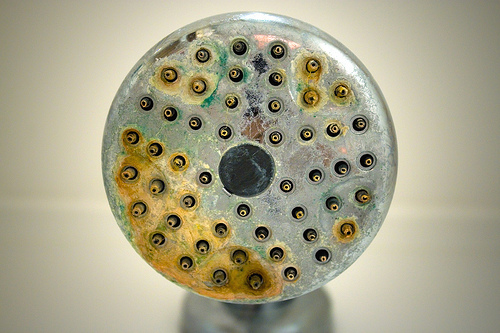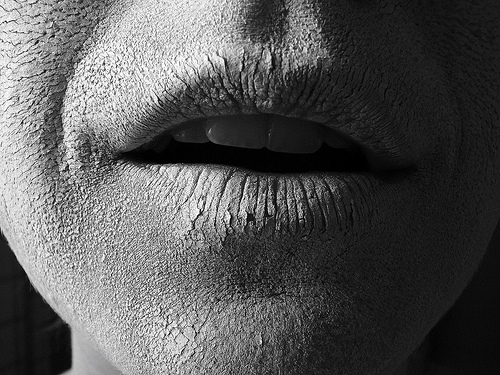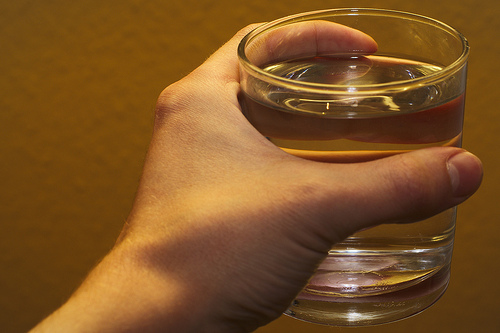Does Your New Home Have Hard Water? 4 Tell-Tale Signs and Solutions
Water is essential to our health and survival, but you shouldn’t have to compromise taste and your plumbing system for quality drinking water. Millions of homes receive what’s known as “hard water” around the US that can damage pipes, leave lime scale buildup, and ruin the taste of drinking water. But how do you know if you have hard water, and what can you do to prevent it? Here are four tips and tricks for reversing hard water damage and providing your house with fresh and potable water.
Lime scale or Corrosion in Bathroom

Image Credit: www.flickr.com
If your shower head has gunk buildup like in the one seen above, or if you start to see a thin layer of white lime scale forming on the walls and door of your shower, then you’re most likely the recipient of hard water. These formations appear when droplets of hard water evaporate from your surfaces and leave behind calcium and magnesium deposits (the naturally-occuring minerals that make water “hard”). Remedying these problems are simple?make a 50/50 solution of water and white vinegar, then wipe down the problem areas. It also helps to fill an empty spray bottle so you can apply the solution to large sections of your bathroom, if the problem is widespread. Repeat as necessary.
Clogged or Damaged Pipes

Image Credit: www.flickr.com
Like in your shower or on your water faucets, hard water can leave buildups of dissolved minerals on the inside of your pipes, as well. These deposits grow and reduce the efficiency of your plumbing and heating systems over time. This will manifest itself as weaker streams of water exiting your shower head and faucets.
In extreme cases, the lime scale buildup can clog your plumbing entirely. The combination of pressure and corrosion will cause damage to your pipes, including holes and fractures from all the mineral deposits. You could go with a temporary solution such as over-the-counter chemical products designed to clear out pipes, but that doesn’t necessarily prevent future problems. Rather, whole house filters offer convenient solutions that permanently remove harmful minerals from your water for every room of your home.
Excessively Dry Hair and Skin

Image Credit: www.flickr.com
Fill up a bottle with tap water, add some dish soap and shake vigorously. If you have a difficult time making suds appear, you most likely have hard water. One of the most frequent complaints associated with hard water is the damaging effect it has on hair and skin. Because materials in hard water make it more difficult for suds to appear and do their jobs, soaps and personal care products used in the bathroom will not work as efficiently, making it harder for the products to moisturize your hair.
Plus, the minerals in hard water will naturally leach moisture from your hair and skin. Until you install a whole house filter, your next best option is use a chelating shampoo that contains the ingredient EDTA. You could also try making your own vinegar-based shampoo and conditioner that will work to break up the mineral deposits in your hair and skin, much like the method used to treat lime scale in bathrooms.
Strange and Unusual Water Taste

Image Credit: www.flickr.com
The presence of various minerals and compounds in hard water can have a noticeable effect on the way it tastes. For example, high levels of chlorides in water (usually put in place to keep it potable) can leave it with a salty taste. Hydrogen sulfide in water can lend a bit of a rotten egg odor, sulfuric taste, and actually accelerate pipe corrosion.
Sodium is also a frequent culprit behind salty water taste, and can lead to blood pressure and hypertension problems if you drink too much over a long period of time. Due to their molecular composition, some of these materials in hard water can’t be removed by boiling water. Again, this is where whole house filters come in handy.
Whether hard water is detrimental to your overall health is debatable, but there’s no doubt that it can lead to excessive household damage and unpleasant taste. Look into whole house filters for eradicating pesky contaminants from your entire home.





